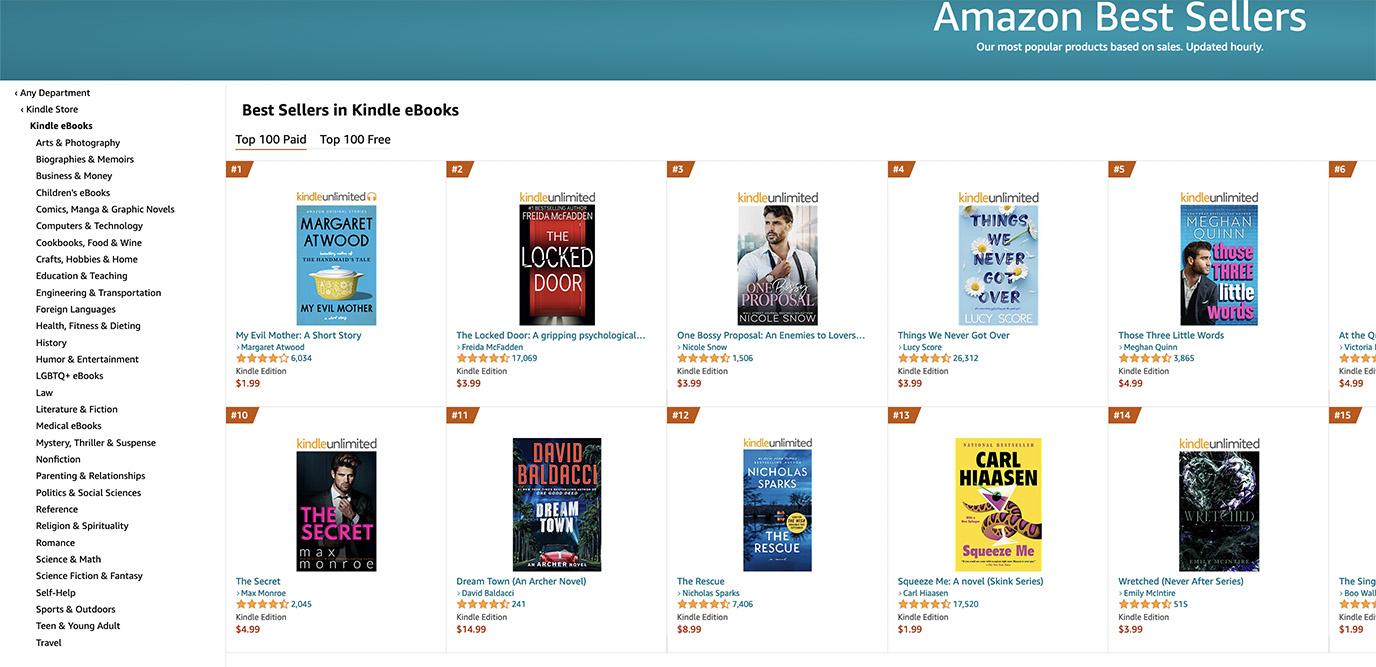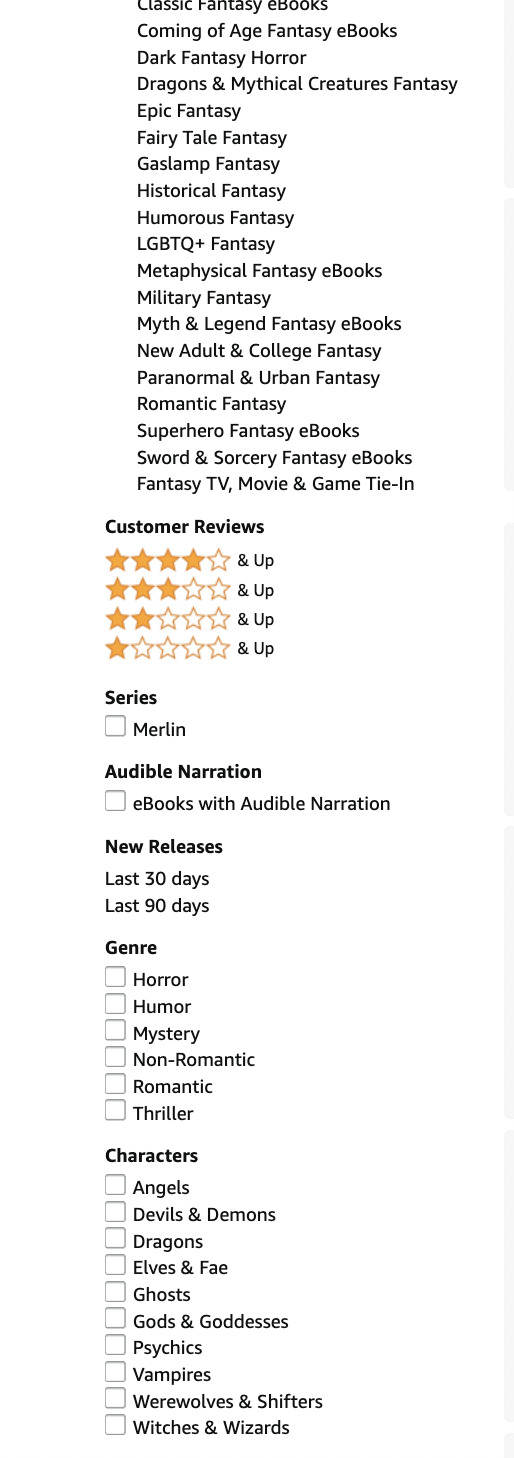SPR’s Cate Baum takes a look at what methods work and don’t work this spring for ranking higher in Amazon’s Best Seller charts with your Kindle eBook.

Amazon has been messing about with its categories quite extensively, but does this mean ranking is going to become more difficult? Yes and no.
Genre is relevant
Now categories are expanded with search terms, it’s more important than ever that you stay in your genre and categories.
Indie romance books will still be able to gain very high ranking when they make sales due to advertising within a niche market. However, without sales, these books could be lost in the masses.
Fantasy, Horror, Mystery and Sci Fi are going to find it increasingly hard to rank due to the amount of books by top-notch authors crowding the space selling thousands of books a day, such as Stephen King, JK Rowling, and Lee Child.
Non-fiction books will find it easier to rank higher with fewer sales, but that has always been the case.
Quality is key
Amazon is definitely expecting a better quality effort on publication of eBooks this year, and as such you will need to up your game
Low-content books, such as puzzle books, coloring books, and notebooks are now being forced out by Amazon, so the old make-quick-money schemes of posting copyright-free and public domain books to make a quick buck are now on the way out. Those authors posting such books are also finding their accounts are banned and blocked by Amazon, and honestly, rightly so.
There is much evidence that books that have formatting errors, are unsightly, too sexy, or have badly-designed covers are also being weeded out and ‘dungeoned’ by Amazon. This means even if your book is on Amazon, it will not come up in searches if as well as having a low-quality product, you are not selling any copies. Amazon limits book visibility for being of an unacceptable quality, or if a customer has complained about your book.
Great book covers are important
It’s always been important to present your book professionally, but now there are consequences in Amazon’s search if you don’t make the effort.
- Don’t scrimp on a book cover. Get a professional to design one for you. As above, quality now counts on Amazon.
- Make sure that your book cover fits with the genre of your work. Look at other books in the categories you want to rank in. What colors are used, and what sort of font and image.
- Make sure it works in thumbnail size. Amazon shows book covers in a tiny size on its site in Best Seller lists, and even smaller in Also… lists, so your cover needs to be readable and clear at that scale. Which of the live book covers above can you read?
Price is essential
Books that sell get higher ranking, and that’s all there is to it
Authors often moan that they don’t want to drop their price because they don’t see why they should after all the work they put into their book. The answer to that is if you price too high, you will sell only a fraction of the books you can sell if you price in the expected range for an independently published eBook, which is from 99c to $2.99.
If you sell less books, you will not rank, as ranking is measured per unit, not takings. Therefore, you are preventing your book from rising in ranking, and so it will remain low on lists and not showing on the first pages of a search, or in that category. If you price your book low, you have a better chance of selling more books, and rising in ranking, therefore selling more books, as your book will come up in searches more often.
Making Amazon’s 70% royalty from $2.99 ($2.09) or 35% from $5.99 ($2.09) is the same royalty, but the lower price of $2.99 will mean you have more chance of selling more books.
 How can I improve my ranking?
How can I improve my ranking?
Ranking is only possible when you sell books. The only way you can sell books is by being seen in listings.
If you are in a genre that is swamped (Romance, SciFi, Fantasy, Thriller, Mystery), stay in the most relevant categories for your book and work on getting sales above all else. Really work on it. Get as many promotions and book tours as you can when you release your book, and keep going. This advice is particularly relevant for Romance authors, who have an amazing network of promo sites and forums to promote to.
Use Amazon and Facebook ads. They work. Spending more than $20 a day on launch for at least 4 days will get you started.
If you are in a genre that still has options with categories, go for the most niche categories you can. Once you start showing up in searches, add broader categories. This way, you will start selling books and ranking in more exposed lists.
With swamped categories, keywords added to your listing are everything. By choosing the best niche keywords that Amazon has in its search engine*, you will be able to find readers searching for your book. This works particularly well with romance books, where adding words such as “bad boy billionaire” or “wealthy” will get you in searches as readers have exacting tastes.
This also works well for Fantasy and Sci Fi niches, where you can choose words such as “Sword and Sorcery” or “Space Opera” to niche down further – see right for an example of Fantasy characters where keywords now form subcategories in the sidebar.
A Note On Keywords
*Note I am saying, “keywords Amazon has in its search engine.”
That’s right, folks. Unlike Google, which changes its algorithm with searches made, Amazon’s search engine is in fact, a catalogue of terms that reacts to an algorithm, i.e. a set of parameters. This means if you choose keywords that are not considered by Amazon as keywords, it’s unlikely you will rank higher for having them, because the algorithm is not recognizing it as such.
There is a theory that because Amazon’s algorithm is based on machine learning, long-tail keywords will work for your book. But that is a misunderstanding of machine learning, which is gradual and not immediate, as it is based on patterns seen in regularly-occurring data. The keyword would need to be recognized as a factor in that category’s ranking to have an effect, i.e., it’s not going to count unless hundreds or maybe thousands of readers search for the exact same term and click only your book and buy it, so it’s doubtful this strategy will work for books published independently that usually sell in their singles, tens, or hundreds.
Not only that, if a book is searched for, clicked, and not bought, it can work in the opposite direction, making your book look undesirable due to the click:buy ratio. Therefore, this idea of adding random and original keywords is probably not the best idea.
You don’t need any fancy keyword generators to find these words, despite the general consensus on author forums. They are clearly listed for you on every category page as Genre, Character, etc., and you can add these to the keywords section of your KDP book listing.
However, before you spit out your coffee in retort, it is true that using long-tailed keywords for your book off Amazon so that it shows in Google results is another matter. By using terms in your title and book description on and off of Amazon book pages, you can ensure that you show up on Google results, linking to your book pages. So although keyword generators are a bit of a waste of time for Amazon, they are certainly useful for sending traffic to your Amazon book page indirectly.
Get an Editorial Review | Get Amazon Sales & Reviews | Get Edited | Publish Your Book | Enter the SPR Book Awards | Other Marketing Services






















good stuff